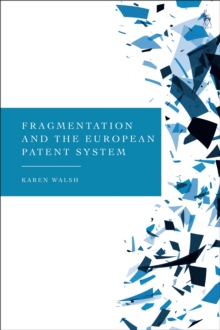Description
| Product ID: | 9781509939312 |
| Product Form: | Hardback |
| Country of Manufacture: | GB |
| Title: | Fragmentation and the European Patent System |
| Authors: | Author: Dr Karen Walsh |
| Page Count: | 240 |
| Subjects: | International law, International law, Patents law, Patents law, Europe |
| Description: | This book provides an in-depth study on current perceptions of, and responses to, fragmentation in the European patent system (EPS). For decades, attempts have been made to address this fragmentation by introducing a unitary patent system. The most recent attempt, the EU unitary patent system, will be the first of its kind. It is expected to significantly change the EPS. However, rather than reducing existing fragmentation, it will likely add to it. Based on an analysis of the current and forthcoming system, the book argues that the inherent nature of fragmentation within the EPS needs to be recognised and suggests that a multifaceted approach is required to respond to it. Uniquely, it draws on work regarding fragmentation outside of the patent and intellectual property regimes, gaining insights from both European law-making and the international legal system. These insights are used to investigate current responses to fragmentation in the EPS. Interpretations of substantive patent law are examined, including claim construction (Actavis v Eli Lily), exceptions to patentability related to uses of human embryos for industrial or commercial purposes (WARF, Brüstle, ISCC), and products resulting from essentially biological processes (Broccoli and Tomatoes II, G3/19). Attempts towards convergence in these areas have had mixed results and in some instances fragmentation may be necessary. However, similar techniques to those applied in the international legal system to respond to fragmentation are being used in the EPS, and, where this is seen, it has been to good effect. It is argued that these methods should be recognised, structured, and promoted to make our response to fragmentation more effective. Fragmentation and the European Patent System will be of interest to academics, students and practitioners looking for a new perspective on the EPS. This book provides an in-depth study on current perceptions of, and responses to, fragmentation in the European patent system (EPS). For decades, attempts have been made to address this fragmentation by introducing a unitary patent system. The most recent attempt, the EU unitary patent system, will be the first of its kind. It is expected to significantly change the EPS. However, rather than reducing existing fragmentation, it will likely add to it. Based on an analysis of the current and forthcoming system, the book argues that the inherent nature of fragmentation within the EPS needs to be recognised and suggests that a multifaceted approach is required to respond to it. Uniquely, it draws on work regarding fragmentation outside of the patent and intellectual property regimes, gaining insights from both European law-making and the international legal system. These insights are used to investigate current responses to fragmentation in the EPS. Interpretations of substantive patent law are examined, including claim construction (Actavis v Eli Lily), exceptions to patentability related to uses of human embryos for industrial or commercial purposes (WARF, Brüstle, ISCC), and products resulting from essentially biological processes (Broccoli and Tomatoes II, G3/19). Attempts towards convergence in these areas have had mixed results and in some instances fragmentation may be necessary. However, similar techniques to those applied in the international legal system to respond to fragmentation are being used in the EPS, and, where this is seen, it has been to good effect. It is argued that these methods should be recognised, structured, and promoted to make our response to fragmentation more effective.Fragmentation and the European Patent System will be of interest to academics, students and practitioners looking for a new perspective on the EPS. |
| Imprint Name: | Hart Publishing |
| Publisher Name: | Bloomsbury Publishing PLC |
| Country of Publication: | GB |
| Publishing Date: | 2022-08-11 |


